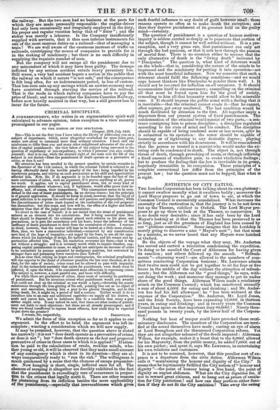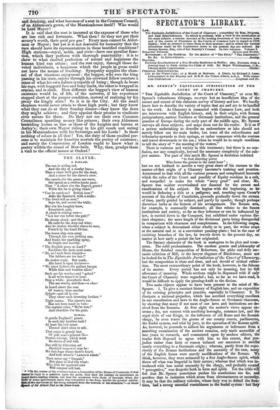/ESTHETICS OF CITY EATING.
THE London Corporation has been talking about its own gluttony: it cannot swallow morally what it swallows bodily ; moreover the Lord Mayor proposes to, go out of town to eat, at which the Common Council is excessively scandalized. What increases the enormity of the rustication is, that the journey is to be not down but up the Thames, videlicet to Oxford. The Lord Mayor pro- poses to go up there to look at the Thames, as conservator. It is no doubt very desirable' since if has only been-by the Lord Mayor's looking at it that the Thames has been preserved to us so long, just as all the greatness of Englaild has been caused by our "glorious constitution." Some imagine that his Lordship is merely going to discover a nice "Mayor's nest " ; but that must be a mistake, as we never heard that any Mayors were hatched at Oxford.
Be the objects of the voyage what they may, Mr. Anderton has moved and carried a resolution condemning the expedition. In doing so he assailed the Court of Aldermen for having given its sanction ; and others 'followed up the assault. "Refresh- ments "—charming wordl—are allowed to the members of com- mittees conducting Corporation business : Mr. Lawrence admits that twelve men could not be got together to sit for four or five hours in the middle of the day without the attraction of refresh- ments; but the Aldermen eat the "good things," he says, with- out doing the work ; and moreover they manage to get an undue share of the good things. Alderman Wilson made a retaliatory attack on the Common Council; which has sanctioned annually a sum of about 4,500/. for eating and drinking ; and Mr. Ander- ton has had his full allowance : he "has been widened at the expense of the Corporation." Mr. Anderton, Mr. Loyd Jones, and the Irish Society, have been expending 12,0001. in thirteen years, in eating and drinking; and in twenty years the Common Council has spent on that important duty 89,600/.1 Ninety thou- sand pounds in twenty years, by the lower half of the Corpora- tion 1 Nothing but heat of temper could have provoked these recri- minatory disclosures. The members of the Corporation are terri- fied at the sound themselves have made ; casting an eye of alarm at Lord Brougham and the threatened Corporation, reform. Yet they are not altogether ashamed of the deeds imputed : Alderman Wilson' for example, makes it a boast that to the 8,000/. allowed for his Mayoralty, from the public money, he added 7,000/. out of his own pocket; and spent it, says Mr. Lawrence, in entertaining his own relations and customers.
It is not to be assumed, however, that this peculiar sort of ex- pense is a departure from the civic duties. Alderman Wilson calls it "maintaining the honour and dignity of the City." It seems that he legitimately fulfilled the City notion of "honour and dignity"—the point of honour being, a freehand, the, point of dignity an august abdomen. What are the City dignities for if not to reward great citizens, and to hang out as prizes of ern:tie- tion for City patriotism ? and how can they perform either func- tion if they do not fit the City ambition? Take away the eating ma drinking, and what becomes of a seat in the Common Council, of an Alderman's gown, of the Mansionhouse itself? Who would be Lord Mayor? It is said that the cost is incurred at the expense of those who are less rich and fortunate. "What then do they not get their money's worth, their quid pro quo? Every man cannot be Alder- man or Mayor; but yet is it not desirable for humanity that the race should have its representatives in those beatified conditions/ sigh stations—royal, noble, and civic—have one peculiar func- tion, which they perform with thorough punctuality: it is to show to what exalted perfection of nature and happiness the Inaman kind can attain ; and the rest enjoy, through those de- voted individuals, a happiness which the people in gross could not have the means of reaching. Sympathy supplies the chan- nel of that vicarious enjoyment : the beggar, who sees the king passing in his state, enjoys through his crowned fellow creature a sense of what his own nature is capable of being; though he bears his rags, with haggard face and bony limbs, the other is wrapped in ermine, and is sleek. How different the beggar's view of human existence would be, of life, of the universe, if his experience stopped short at the pauper condition, instead of realizing by his proxy the kingly state So it is in the City. All the small shopmen would never attain to those high posts ; but they know What they can do at their Sunday dinner—they know the feats they might achieve; and they appoint their proxies to vindicate civic nature for them. Do they not see their own Common Councilmen spending money like princes their own Aldermen bestriding horses as fine as those of the knights and barons at Aatley ,'s their own Mayor riding in his gilt coach and eating in his Mansionhouse with his Sovereign and his Lords ? Is there nothing of solace in all that ? Yes, the duty of those exalted per- sons is to maintain for humbler mortals the poetry of existence; and surely. the Corporation of London ought to know what is poetry within the sound of Bow-bells. Why, then, grudge them a v3sit to the official muses at Oxford ?



























 Previous page
Previous page